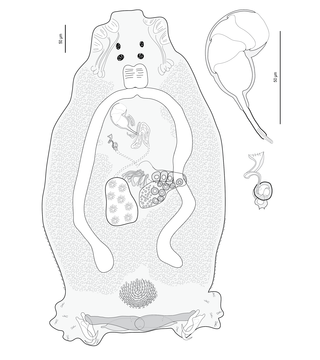Pseudorhabdosynochus auitoe is a diplectanid monogenean parasitic on the gills of the Highfin grouper, Epinephelus maculatus. It was described in 2007.
Pseudorhabdosynochus buitoe is a diplectanid monogenean parasitic on the gills of the Highfin grouper, Epinephelus maculatus. It has been described in 2007.
Pseudorhabdosynochus fuitoe is a diplectanid monogenean parasitic on the gills of the highfin grouper, Epinephelus maculatus. It has been described in 2007.
Pseudorhabdosynochus guitoe is a diplectanid monogenean parasitic on the gills of the Highfin grouper, Epinephelus maculatus. It has been described in 2007.
Pseudorhabdosynochus huitoe is a diplectanid monogenean parasitic on the gills of the highfin grouper, Epinephelus maculatus. It was described in 2007.

Pseudorhabdosynochus malabaricus is a diplectanid monogenean parasitic on the gills of the malabar grouper, Epinephelus malabaricus. It has been described in 2007.

Pseudorhabdosynochus maternus is a diplectanid monogenean parasitic on the gills of the Malabar grouper, Epinephelus malabaricus. It has been described in 2007.

Pseudorhabdosynochus maaensis is a diplectanid monogenean parasitic on the gills of the malabar grouper, Epinephelus malabaricus. It has been described in 2007.

Pseudorhabdosynochus manipulus is a diplectanid monogenean parasitic on the gills of the malabar grouper, Epinephelus malabaricus. It was first described in 2007.

Pseudorhabdosynochus caledonicus is a diplectanid monogenean parasitic on the gills of the Blacktip grouper, Epinephelus fasciatus. It has been described in 2005.
Pseudorhabdosynochus calathus is a diplectanid monogenean parasitic on the gills of the grouper Epinephelus rivulatus. It has been described in 2006.
Pseudorhabdosynochus variabilis is a diplectanid monogenean parasitic on the gills of the grouper Epinephelus morrhua. It has been described in 2008.
Pseudorhabdosynochus inversus is a diplectanid monogenean parasitic on the gills of the halfmoon grouper, Epinephelus rivulatus. It was described in 2008, from only three specimens.
Pseudorhabdosynochus quadratus is a species of diplectanid monogenean that is parasitic on the gills of the white-streaked grouper Epinephelus ongus. It was described in 2011.
Pseudorhabdosynochus chauveti is a species of diplectanid monogenean that is parasitic on the gills of the blue grouper Epinephelus cyanopodus. It was described in 2008.
Pseudorhabdosynochus cyanopodus is a species of diplectanid monogenean that is parasitic on the gills of the blue grouper Epinephelus cyanopodus. It was described in 2008.
Pseudorhabdosynochus podocyanus is a species of diplectanid monogenean that is parasitic on the gills of the blue grouper Epinephelus cyanopodus. It was described in 2008.
Pseudorhabdosynochus exoticoides is a species of diplectanid monogenean that is parasitic on the gills of the brownspotted grouper Epinephelus chlorostigma. It was described in 2010.
Laticola cyanus is a species of diplectanid monogenean that is parasitic on the gills of the blue grouper Epinephelus cyanopodus. It was described in 2008.
Pseudorhabdosynochus cupatus is a species of diplectanid monogenean parasitic on the gills of groupers.





